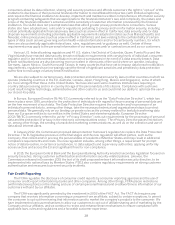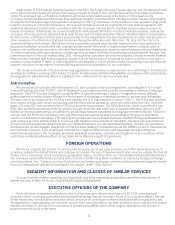American Express 2015 Annual Report Download - page 37
Download and view the complete annual report
Please find page 37 of the 2015 American Express annual report below. You can navigate through the pages in the report by either clicking on the pages listed below, or by using the keyword search tool below to find specific information within the annual report.
The FDIA generally prohibits a bank, including Centurion Bank and American Express Bank, from accepting
brokered deposits or offering interest rates on any deposits significantly higher than the prevailing rate in its normal
market area or nationally (depending upon where the deposits are solicited), unless (1) it is well capitalized or (2) it is
adequately capitalized and receives a waiver from the FDIC. A significant amount of our outstanding U.S. retail
deposits has been raised through third-party brokerage networks, and such deposits are considered brokered
deposits for bank regulatory purposes. A bank that is less than well capitalized generally may not pay an interest rate
on any deposit, including direct-to-consumer deposits, in excess of 75 basis points over the national rate published by
the FDIC unless the FDIC determines that the bank is operating in a high-rate area. An adequately capitalized insured
depository institution may not accept, renew or roll over any brokered deposit unless it has applied for and been
granted a waiver of this prohibition by the FDIC. Undercapitalized depository institutions may not solicit deposits by
offering interest rates that are significantly higher than the prevailing rates of interest on insured deposits in such
institution’s normal market areas or in the market area in which such deposits would otherwise be accepted. There are
no such restrictions on a bank that is well capitalized (provided such bank is not subject to a capital maintenance
provision within a written agreement, consent order, order to cease and desist, capital directive, or prompt corrective
action directive issued by its federal regulator). If a depository institution’s federal regulator determines that the
institution is in an unsafe or unsound condition or is engaging in unsafe or unsound banking practices, the regulator
may reclassify a well capitalized institution as adequately capitalized, require an adequately capitalized institution to
comply with certain restrictions as if it were undercapitalized, or require an undercapitalized institution to take certain
actions applicable to significantly undercapitalized institutions, all of which would adversely impact the institution’s
ability to accept brokered deposits. For a description of our deposit programs, see “Deposit Programs” under “U.S.
Card Services — Consumer and Small Business Services.”
The FDIA generally prohibits an FDIC-insured depository institution from making any capital distribution
(including payment of dividends) or paying any management fee to its holding company if the depository institution
would thereafter be undercapitalized. Undercapitalized depository institutions are subject to restrictions on borrowing
from the Federal Reserve and to growth limitations, and are required to submit a capital restoration plan. Significantly
undercapitalized depository institutions may be subject to a number of requirements and restrictions, including orders
to sell sufficient voting stock to become adequately capitalized, requirements to reduce total assets and cessation of
receipt of deposits from correspondent banks. Critically undercapitalized depository institutions are subject to
appointment of a receiver or conservator.
Transactions Between Centurion Bank or American Express Bank and Their Respective Affiliates
Certain transactions (including loans and credit extensions from Centurion Bank and American Express Bank)
between Centurion Bank and American Express Bank, on the one hand, and their affiliates (including the Company,
TRS and their non-bank subsidiaries), on the other hand, are subject to quantitative and qualitative limitations,
collateral requirements, and other restrictions imposed by statute and regulation. Transactions subject to these
restrictions are generally required to be made on an arms-length basis. These restrictions generally do not apply to
transactions between a depository institution and its subsidiaries.
FDIC Deposit Insurance and Insurance Assessments
Centurion Bank and American Express Bank accept deposits and those deposits are insured by the FDIC up to the
applicable limits. Under the FDIA, the FDIC may terminate the insurance of an institution’s deposits upon a finding that
the institution has engaged in unsafe or unsound practices, is in an unsafe or unsound condition to continue
operations, or has violated any applicable law, regulation, rule, order or condition imposed by the FDIC. We do not
know of any practice, condition or violation that might lead to termination of deposit insurance at either of our insured
depository institution subsidiaries.
The FDIC’s deposit insurance fund is funded by assessments on insured depository institutions, which are subject
to adjustment by the FDIC. For example, on October 22, 2015, the FDIC proposed rules imposing a temporary
assessment surcharge for banks with at least $10 billion in assets. This surcharge would result in increased costs for
Centurion Bank and American Express Bank.
FDIC Powers upon Insolvency of Insured Depository Institutions
If the FDIC is appointed the conservator or receiver of an insured depository institution, such as Centurion Bank or
American Express Bank, upon its insolvency or in certain other events, the FDIC has the power: (1) to transfer any of
the depository institution’s assets and liabilities to a new obligor without the approval of the depository institution’s
creditors; (2) to enforce the terms of the depository institution’s contracts pursuant to their terms; or (3) to repudiate
or disaffirm any contract or lease to which the depository institution is a party, the performance of which is determined
by the FDIC to be burdensome and the disaffirmation or repudiation of which is determined by the FDIC to promote
the orderly administration of the depository institution.
In addition, under federal law, the claims of holders of U.S. deposit liabilities and certain claims for administrative
expenses of the FDIC against an insured depository institution would be afforded priority over other general unsecured
claims against the institution, including claims of debt holders of the institution and depositors in non-U.S. offices, in
26
























